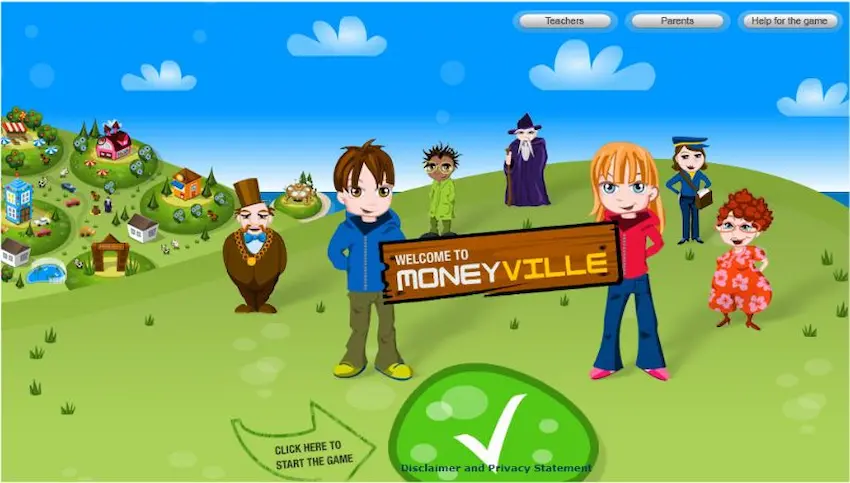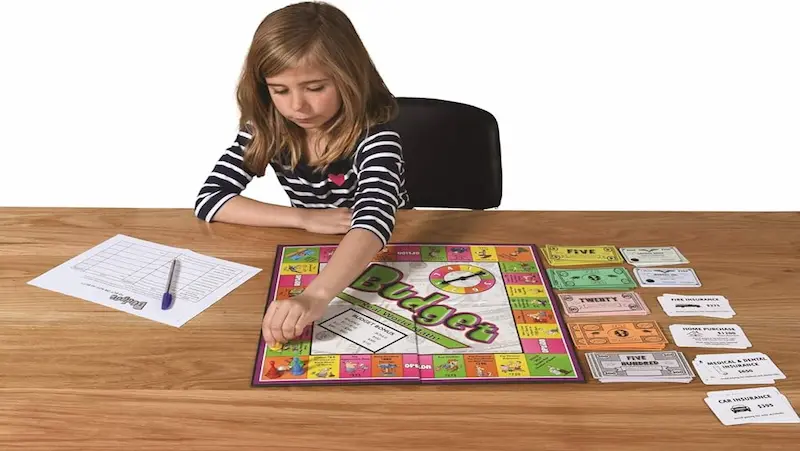Introduction
Financial literacy is a crucial life skill, and it’s never too early or too late to start learning how to manage money wisely. Our financial decisions impact every aspect of our lives, teaching financial literacy from a young age is essential. However, educating ourselves or our children about finances doesn’t have to be dull or intimidating. One of the most effective ways to impart financial knowledge is through games.
In this comprehensive guide, we’ll explore the top 10 fun games that teach financial literacy, catering to all age groups. Let’s dive in and discover how these engaging games can shape financial understanding for individuals of all ages.
Table of contents
Games for Kids (Ages 5-10)
Moneyville Adventures
Moneyville Adventures is one interactive financial literacy game for kids designed to introduce kids to the concept of money and its uses, and it helps to teach kids about money. This delightful game not only teaches kids the value of money but also how to earn it and make simple spending decisions. The colorful and imaginative world of Moneyville provides the perfect backdrop for young minds to grasp these fundamental financial concepts.
Learning Objectives: This game helps children understand the value of money, how to earn it, and how to make simple spending decisions. By engaging in various tasks and making choices about how to spend or save their virtual earnings, kids develop a practical understanding of financial responsibility.
How to Play: Players embark on a journey through Moneyville, completing tasks and earning money in the game. Along the way, they are encouraged to make choices about how to spend or save their earnings, fostering a sense of financial agency and decision-making skills.

Piggy Bank Adventures
Piggy Bank Adventures is a game that educates kids about saving money in a fun and engaging way. This game cleverly introduces the concept of saving and encourages young players to set savings goals, all while having a blast.
Learning Objectives: Piggy Bank Adventures focuses on teaching kids the importance of saving, setting savings goals, and making wise choices with their money. As they complete challenges and make smart choices within the game, children develop a sense of responsibility and financial prudence.
How to Play: Players dive into a world of savings with their virtual piggy banks which also encourage them to start a piggy bank for kids. By successfully completing challenges and making astute choices, they watch their piggy banks grow, instilling valuable lessons about the rewards of saving and making prudent financial decisions.
Games for Tweens (Ages 11-14)
Cashflow for Kids
Cashflow for Kids is an adaptation of Robert Kiyosaki’s Cashflow board game, tailored for younger players. This game offers an exciting opportunity for tweens to immerse themselves in financial vocabulary, understand assets and liabilities, and explore the world of investments.
Learning Objectives: As tweens engage with Cashflow for Kids, they delve into the world of financial literacy, gaining insights into assets and liabilities, and mastering the art of making informed investments. Through this gameplay, they develop crucial financial skills that will serve them well in the future.
How to Play: To excel in Cashflow for Kids, players aim to build passive income by making sound financial decisions. This dynamic game empowers tweens to explore financial concepts in a way that is both educational and entertaining.
Monopoly
Monopoly, the classic board game, offers tweens a chance to learn about property management, investments, and strategic decision-making. With its enduring popularity, it remains a top choice for tweens seeking an engaging financial learning experience.
Learning Objectives: Monopoly goes beyond mere gameplay by enhancing negotiation skills, fostering an understanding of market forces, and highlighting the importance of careful financial planning. Tweens engage in property acquisition, trading, and management, helping them grasp essential financial concepts.
How to Play: In Monopoly, players compete to buy, trade, and manage properties to build wealth and outsmart their opponents. Through the twists and turns of the game, tweens discover the strategic aspects of financial decision-making, making this classic game a valuable educational tool.
Games for Teens (Ages 15-18)
Stock Market Game
The Stock Market Game provides teenagers with the opportunity to simulate real stock market trading. It gives them the idea and answers for many questions starting from “what are stocks” to upcoming revolution which is digital currency. This immersive experience allows players to explore the world of stocks, investing, and the importance of thorough research in making informed financial decisions.
Through participation in the Stock Market Game, teenagers gain a practical understanding of stocks, investing strategies, and the significance of research in the realm of financial decision-making. This hands-on approach prepares them for real-world financial challenges.
Participants in the Stock Market Game engage in virtual stock trading and compete to grow their investment portfolios. This dynamic gameplay not only educates teenagers about the stock market but also hones their financial acumen in an exciting and competitive environment.

The Game of Life
The Game of Life offers a glimpse into adult life, encompassing career choices, financial planning, and the unpredictability of unexpected expenses. This game serves as a valuable tool for teenagers to explore financial aspects of adulthood in a controlled and engaging setting.
Learning Objectives: Teenagers playing The Game of Life confront the financial implications of various life choices, helping them develop budgeting skills and an understanding of the complexities of financial planning. They make decisions that significantly impact their financial future, offering them a taste of real-life financial responsibilities.
How to Play: In The Game of Life, players navigate through life’s ups and downs, making decisions that directly influence their financial well-being. This interactive experience encourages teenagers to consider the financial aspects of adulthood while having fun and learning through play.
Games for Young Adults (Ages 19-25)
Budget Challenge
Budget Challenge is an online game designed to simulate the financial responsibilities of young adults. By immersing players in real-life financial scenarios, it offers a hands-on approach to understanding and managing financial challenges.
Learning Objectives: Budget Challenge places a strong emphasis on budgeting, managing bills, and dealing with financial challenges commonly faced by young adults. Players learn through practical experience, allowing them to develop essential financial skills that will serve them well in their transition to adulthood.
How to Play: Players participating in Budget Challenge create a budget, pay bills, and make financial decisions that are critical to achieving financial success. This online game not only educates young adults about financial responsibility but also provides them with a valuable platform to apply and refine their financial knowledge.
Cash Crunch 101
Cash Crunch 101 is a mobile game designed to educate young adults about handling everyday financial scenarios. By immersing players in relatable financial challenges, it fosters an understanding of budgeting, saving, and making responsible financial choices.
Learning Objectives: Cash Crunch 101 offers players insights into the importance of budgeting, saving, and making responsible financial choices. Through engaging gameplay, young adults learn practical financial skills that are directly applicable to their lives.
How to Play: Players engage in Cash Crunch 101 by navigating real-life financial challenges and making choices that impact their financial stability. This mobile game offers young adults a fun and interactive way to prepare for the financial responsibilities they will encounter in their daily lives.
Games for Adults (Ages 26+)
Catan: Oil Springs
Catan: Oil Springs is an expansion of the popular board game Settlers of Catan, introducing economic concepts to adult players. This game presents a unique opportunity for adults to delve into resource management, trade, and economic strategy within the world of Catan.
Learning Objectives: As adults explore Catan: Oil Springs, they gain insights into resource management, trade dynamics, and economic strategy. This engaging gameplay challenges them to make shrewd decisions that have a direct impact on their economic prosperity.
How to Play: In Catan: Oil Springs, players build settlements, trade resources, and develop a thriving economy within the world of Catan. This expansion not only offers hours of entertainment but also deepens adults’ understanding of economic concepts in an interactive and enjoyable manner.
Payday
Payday, the classic board game, simulates the financial ups and downs of life for adult players. This game provides a compelling experience that mirrors the financial responsibilities and challenges faced by adults, making it a relevant and engaging choice for this age group.
Learning Objectives: Through gameplay, Payday teaches adults about managing bills, saving, and dealing with unexpected expenses. This classic board game offers a practical approach to understanding the financial intricacies of adulthood.
How to Play: Players in Payday manage their finances throughout a simulated month, striving to achieve financial success. This immersive experience allows adults to apply their financial knowledge in a controlled environment, preparing them for the financial realities they encounter in their daily lives.

Benefits of Using Games for Financial Literacy
Improved Financial Decision-Making
Games not only educate or type of a learning resource it also encourages players to weigh the consequences of their choices and make informed financial decisions. By experiencing the results of their actions within the game, individuals develop the skills needed to make better financial choices in real life.
Enhanced Money Management Skills
Playing financial literacy games fosters the development of practical money management skills. Players learn to budget, save, invest, and comprehend the value of money through hands-on gameplay, equipping them with essential financial competence.
Increased Engagement and Fun
Learning about finances becomes enjoyable and memorable when presented in a game format. The interactive and entertaining nature of financial literacy games ensures that individuals of all ages remain engaged and motivated to continue learning about financial responsibility.
Conclusion
The power of play in financial education cannot be underestimated. Teaching financial literacy through games makes the learning experience enjoyable and effective. These top 10 games cater to various age groups, ensuring that everyone, from kids to adults, can gain essential financial knowledge while having fun. So, why not start your financial education journey with a game? It’s time to play your way to financial success, gaining knowledge and skills that will serve you well throughout your life.
To get your hands on more educational and free resources on coding for kids, robotics for kids, financial education for kids, etc., do check out the BrightCHAMPS Page now!
To get your hands on more such articles, educational content, and free resources on coding for kids, robotics courses, game development, etc., check out the BrightCHAMPS Blog Page now!
Frequently Asked Questions (FAQ’S)
A1. The ideal age to begin teaching financial literacy through games varies, but it’s generally recommended to start introducing financial concepts as early as possible. Children can start as young as preschool age with simple games that teach basic money concepts like counting and identifying coins. As they grow, more complex financial games can be introduced, typically in elementary school and onwards. The key is to adapt the complexity of the games to the child’s developmental stage, gradually covering topics like saving, budgeting, investing, and more as they mature.
A2. Yes, there are many financial literacy games available for free. Numerous educational websites, apps, and resources offer games that teach financial concepts at no cost. Some examples include websites like Practical Money Skills, which provides free financial games for various age groups, and apps like Money Metropolis, designed for kids. Additionally, many non-profit organizations and government agencies create and distribute free financial literacy games and materials to promote financial education.
A3. Yes, well-designed financial literacy games can effectively teach practical financial skills. Games have the advantage of making learning engaging and interactive, allowing players to apply financial concepts in a safe and controlled environment. Through games, players can practice making financial decisions, setting budgets, saving, and investing, which can translate into real-world skills. However, it’s important to complement game-based learning with discussions and real-life experiences to reinforce these skills.
A4. Identify age-appropriate games: Select financial literacy games that are suitable for the child’s age and knowledge level. Look for games that cover relevant concepts.
Set aside dedicated time: Create a consistent schedule for financial game sessions. This can be integrated into the curriculum for educators or as a regular family activity at home.
Play together: Parents and educators can actively participate in the games alongside children to provide guidance, answer questions, and facilitate discussions about the financial concepts being taught.
Encourage discussions: After playing a financial game, discuss the lessons learned, and encourage children to ask questions. Discuss how the concepts apply to their daily lives.
Real-life application: Connect the game scenarios to real-life situations. For example, if a game teaches budgeting, encourage children to create a simple budget for their allowance or savings.
Use a variety of resources: Combine financial games with books, videos, and real-world experiences to provide a comprehensive financial education.
Monitor progress: Keep track of a child’s progress and adjust the complexity of games as they grow and their understanding of financial concepts deepens.


 We are an army of educators and passionate learners from BrightChamps family, committed to providing free learning resources to kids, parents & students.
We are an army of educators and passionate learners from BrightChamps family, committed to providing free learning resources to kids, parents & students.








